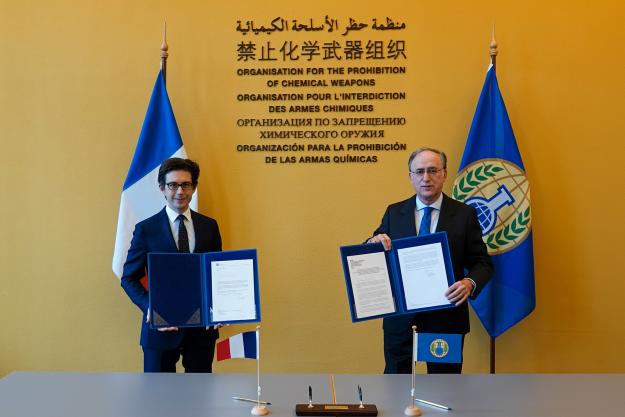
H.E. Mr Luis Vassy, Permanent Representative of France to the OPCW, and H.E. Mr Fernando Arias, Director-General of the OPCW
THE HAGUE, Netherlands–31 March 2021–The Government of France has contributed a further €200,000 to a special Organisation for the Prohibition of Chemical Weapons (OPCW) Trust Fund to support the construction of a new facility, the OPCW Centre for Chemistry and Technology (“ChemTech Centre”).
The contribution was formalised during a ceremony between the Permanent Representative of France to the OPCW, H.E. Ambassador Luis Vassy, and OPCW Director-General, H.E. Mr Fernando Arias, which was held today at OPCW Headquarters in The Hague.
Ambassador Vassy stated: “I am very honoured to announce today this new donation from France, which will allow the OPCW to launch the construction of the ChemTech Centre. Serving our collective security, the future Centre will strengthen the OPCW’s ability to address the threat of the re-emergence of chemical weapons use. It will also be a centre of excellence and a training platform, in the interests of international cooperation. We are pleased to contribute to bringing this project into existence and we recall France’s unwavering commitment to the Chemical Weapons Convention.”
The Director-General expressed his gratitude to the Government of France and noted: “With this generous contribution from France, the ChemTech Centre Trust Fund has met its fundraising target for the Centre’s construction. This is an important milestone in the project that will allow the OPCW to sign the contract with the selected construction company and immediately initiate the preparations for the construction to begin in the summer.”
Director-General Arias expressed his gratitude to the OPCW States Parties and other donors who supported the project. He further emphasised the important role the new ChemTech Centre will play in strengthening the OPCW’s ability to address chemical weapon threats and enhance capacity building activities to the benefit of all 193 OPCW Member States.
So far, 46 countries, the European Union, and four other donors have contributed or pledged to contribute financially to the ChemTech Centre project, and €33.6M has been raised to date.
States Parties are encouraged to continue participating in this important project. Voluntary contributions will further be used to finance equipment and activities related to International Cooperation and Assistance to be performed at, by and/or through the ChemTech Centre.
Background
The project to build the ChemTech Centre is on-going and seeks to strengthen the OPCW’s capabilities to fully address new and emerging chemical weapons threats, as well as to support capacity building in OPCW Member States. The current OPCW Laboratory and Equipment Store are central to the effectiveness and integrity of the verification regime of the Chemical Weapons Convention, and they also contribute to the OPCW’s capacity building and international cooperation activities. However, the current facility will soon no longer be fit-for-purpose due to its ageing infrastructure, space constraints, larger workloads, and new missions with new areas of work.
A new facility is required to meet the demands of OPCW Member States for enhanced verification tools, improved detection capabilities and response measures, as well as increased capacity building activities. The ChemTech Centre will also help the OPCW to keep pace with developments in science and technology and new chemical weapons threats. Construction of the ChemTech Centre is scheduled to begin in 2021 and the building is currently planned to be operational by the end of 2022.
To date, the following Member States have contributed or pledged to contribute to the project: Algeria, Andorra, Angola, Australia, Bangladesh, Belgium, Canada, Chile, China, Cyprus, the Czech Republic, Estonia, Finland, France, Germany, Greece, Hungary, Indonesia, Ireland, Italy, Japan, Kazakhstan, Lithuania, Luxembourg, Malaysia, Malta, Morocco, the Netherlands, New Zealand, Pakistan, Peru, Poland, Portugal, the Republic of Korea, Romania, Slovakia, Slovenia, Spain, Sweden, Switzerland, Thailand, Turkey, United Arab Emirates, the United Kingdom of Great Britain and Northern Ireland, and the United States of America. The European Union, Israel (a signatory state) and other donors have also contributed.
As the implementing body for the Chemical Weapons Convention, the OPCW, with its 193 Member States, oversees the global endeavour to permanently eliminate chemical weapons. Since the Convention’s entry into force in 1997, it is the most successful disarmament treaty eliminating an entire class of weapons of mass destruction.
Over 98% of all declared chemical weapon stockpiles have been destroyed under OPCW verification. For its extensive efforts in eliminating chemical weapons, the OPCW received the 2013 Nobel Peace Prize.
More Information
- Remarks by the Permanent Representative of France to the OPCW, H.E. Ambassador Luis Vassy (French, with English translation)
- Remarks by OPCW Director-General, H.E. Mr Fernando Arias (French, with English translation)
- OPCW ChemTech Centre
- Promoting Chemistry for Peace
- France at the OPCW
- Photos from the Ceremony
- OPCW Basics
